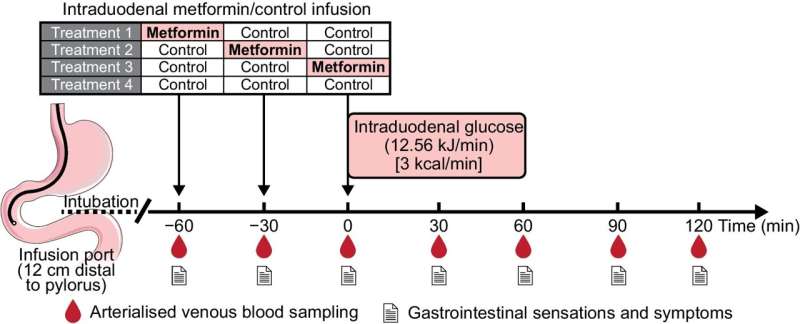This article has been reviewed according to Science X's editorial process and policies. Editors have highlighted the following attributes while ensuring the content's credibility:
fact-checked
peer-reviewed publication
trusted source
proofread
Researchers determine timing is key for type 2 diabetes drug performance

Researchers from the University of Adelaide could be closer to discovering a better way to use metformin, a common type 2 diabetes medication.
Metformin, which has been a cornerstone in diabetes treatment since the 1960s, is typically taken with meals to reduce gastrointestinal side effects, but new research is suggesting patients could see improved results if it's taken before meals.
Dr. Cong Xie postdoctoral research fellow in the Centre of Research Excellence in Translating Nutritional Science to Good Health, at Adelaide Medical School, worked with Associate Professor Tongzhi Wu and a team which studied the gastrointestinal effects of the drug on 16 people living with type 2 diabetes who were already using it to treat the condition.
Their findings were published in the journal Diabetologia and are now being used in e-learning by the European Association for the Study of Diabetes (one of the largest international platforms for diabetes research and clinical practice).
"Our results demonstrate administering metformin 30 to 60 minutes before a meal reduces plasma glucose levels while increasing the secretion of the incretin hormone glucagon-like peptide 1 (GLP-1) and insulin levels," Dr. Xie said.
"GLP-1 is a hormone secreted from the gut, which exhibits several actions, including the suppression of appetite, stimulation of insulin, slowing of gastric emptying and the subsequent glucose absorption in the intestine, all of which are beneficial for the control of blood sugar and body weight.
"A number of GLP-1-based drugs are now used clinically for the management of obesity and type 2 diabetes; these drugs also reduce the risk of cardiovascular disease."
Dr. Xie said the plasma GLP-1 levels increased only when metformin was given before the subjects were given a glucose infusion and not at the same time.
"This suggests the levels are affected by changes in the glucose-gut interaction," he said.
Associate Professor Wu said the study found there was no real difference to the nausea scores of patients between the administration times.
"The findings of our study suggest that the empirical recommendation for ingestion of metformin with meals may have compromised its efficacy to improve blood glucose control after meals," he said. "Modification of the timing of metformin ingestion in relation to meals could be a cost-effective approach to improve glycemic control in people living with type 2 diabetes."
Wu added, "We are now planning to extend this research in a real-world setting to examine whether administration of metformin before meals will lead to better blood glucose control in people with type 2 diabetes in the long term."
More information: Cong Xie et al, Impact of the timing of metformin administration on glycaemic and glucagon-like peptide-1 responses to intraduodenal glucose infusion in type 2 diabetes: a double-blind, randomised, placebo-controlled, crossover study, Diabetologia (2024). DOI: 10.1007/s00125-024-06131-6




















